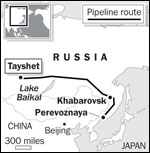Entered into the database on Wednesday, March 08th, 2006 @ 18:34:05 MST
A plan to build an oil pipeline that green activists and many experts
say could severely damage Lake Baikal, the world’s deepest freshwater
lake, has been approved by Russia’s environmental watchdog. Transneft, the state pipeline monopoly, is proposing to build the $11 billion
(£6.3 billion) pipeline from Eastern Siberia to the Pacific Coast, via the
Chinese border, to supply oil-thirsty Asian markets. The proposed route comes within 800m of Baikal, a Russian national treasure
and a Unesco World Heritage Site that contains 20 per cent of the world’s
unfrozen fresh water. Environmental activists said that they would fight the
decision in the courts and organise protests in defence of Baikal, which is
home to hundreds of species and revered by local ethnic minorities. A panel of experts from Rostekhnadzor, the environmental watchdog, overwhelmingly
rejected the plan last month on the ground that Baikal could be irreparably
damaged if the pipeline ruptured. Out of 52 experts on the commission, 46 ruled that there were insufficient
safeguards to protect the pipeline from the region’s frequent and powerful
earthquakes. But Konstantin Pulikovsky, the head of Rostekhnadzor, refused to
endorse the decision and appointed an extra 34 people to the commission, which
then approved the project on March 3. Opponents of the plan accused him of excluding scientists who were against
the project and adding others who supported it, to get the necessary two-thirds
majority. Gennady Chegasov, a member of the commission, said that other panel members
had been threatened with losing their jobs — a tactic that he said would
have been unusual even in the Soviet era. “The unprecedented amount of
boorishness and pressure would not be possible without the Government’s
support,” he said. “I am prepared to appear as an expert and as
a witness of the violations that took place.” Greenpeace is appealing to American, European and Japanese banks to refuse
to finance the project. Roman Vazhenkov, Greenpeace campaign co-ordinator, said:
“This decision once again demonstrates that private interests of a group
of oil industry officials . . . have more weight than the law, opinions of scientists
and Russian citizens, and than the future of the world’s most unique freshwater
lake.” But analysts say that the project is certain to go ahead since President Putin
has personally approved it and last year accused its opponents of hampering
Russia’s development. The Natural Resources Ministry turned down the proposed route in September
but reversed its decision two months later under what was widely seen as pressure
from the Kremlin. Transneft expects to start building the pipeline in May, when the Government
is likely to give its final approval to the project. It says that changing the
route would unnecessarily delay construction and add hundreds of millions of
dollars to the cost of the project. Simon Vainshtok, Transneft’s president, promised in an interview last
month that the pipeline would be three times the usual thickness around Baikal
to ensure that there were no leaks. “Transneft will take all the requisite precautions for Baikal to stay
safe,” he told the government newspaper, Rossiyskaya Gazeta. He also said that Greenpeace and other environmental groups were being manipulated
by “puppet masters” outside Russia, who did not want China to grow
in strength by importing more Russian oil. Transneft says that the pipeline will be completed within three years and will
pump up to 1.6 million barrels a day to China and the Pacific coast. Most environmental
activists say that they do not object to the pipeline, only its proposed route.
“Even if billions of dollars are at stake, the Russian Government cannot
put Lake Baikal at risk,” said Andrei Poyarkov, a member of the expert
panel and a biologist at the Institute of Ecology and Evolution in the Russian
Academy of Sciences. “They do not have the right.” WORLD'S DEEPEST AND OLDEST LAKE Lake Baikal was designated a Unesco World Heritage Site 10 years ago Deepest (1,700m) and oldest (25 million years) freshwater lake; contains
nearly 20 per cent of the world’s unfrozen fresh water Holds more endemic species of plants and animals than any other lake Home to the world’s only freshwater seals. Fish include salmon, sturgeon,
burbot, oilfish, bullhead, grayling and omul Contains more than 1,000 species of aquatic flora, including 20 flowering
plants The surrounding forests are home to many animals, including bears, elk, lynx,
and sable The lake’s origin continues to be debated; one theory says that it
is a result of the Earth’s crust slowly subsiding The soil in the lake has increased by two and half times over the past century
because of agricultural and industrial development
